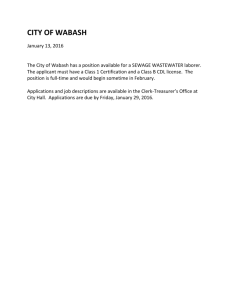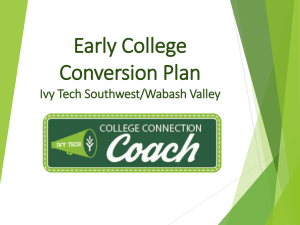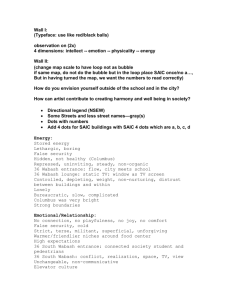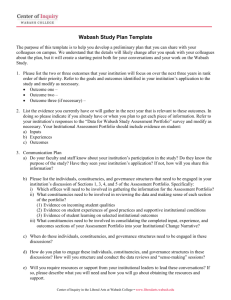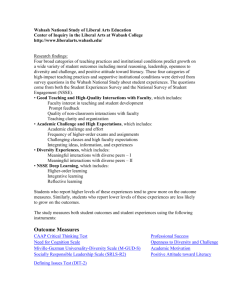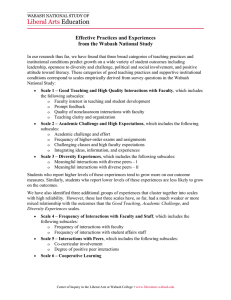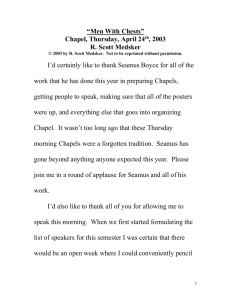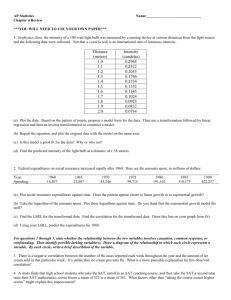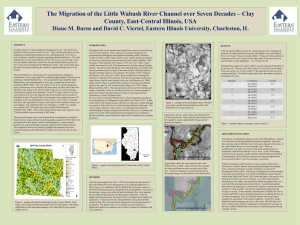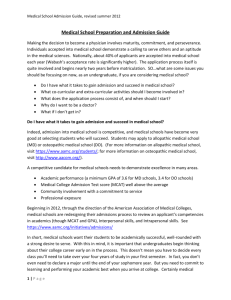Purpose of the Wabash National Study To learn what teaching
advertisement
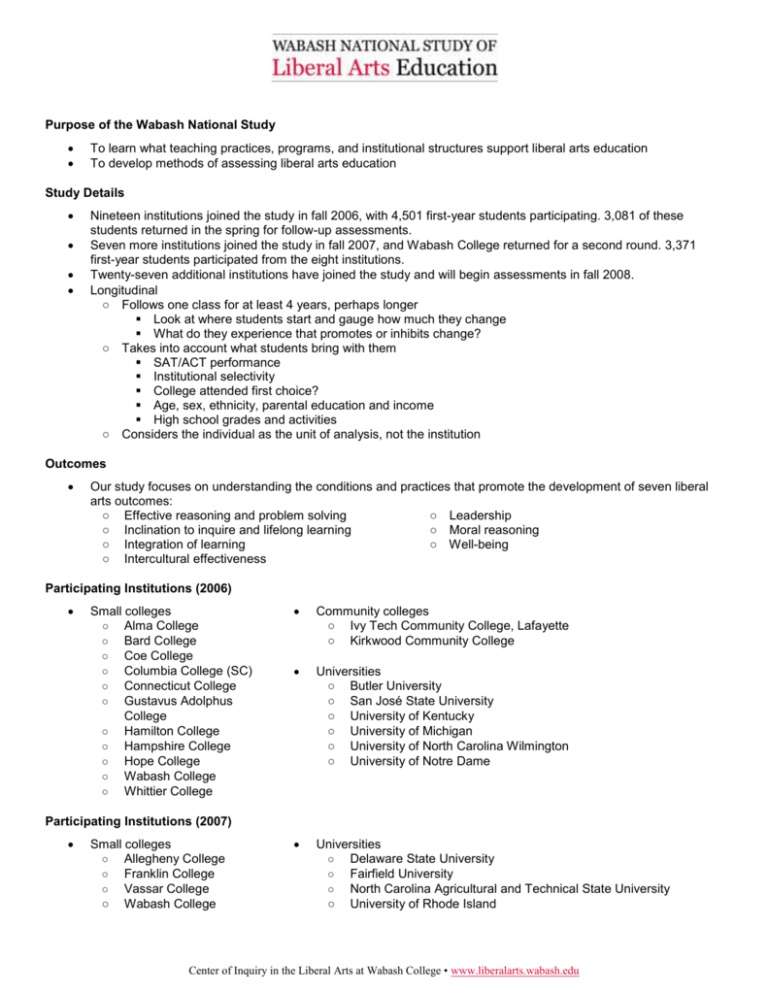
Purpose of the Wabash National Study To learn what teaching practices, programs, and institutional structures support liberal arts education To develop methods of assessing liberal arts education Study Details Nineteen institutions joined the study in fall 2006, with 4,501 first-year students participating. 3,081 of these students returned in the spring for follow-up assessments. Seven more institutions joined the study in fall 2007, and Wabash College returned for a second round. 3,371 first-year students participated from the eight institutions. Twenty-seven additional institutions have joined the study and will begin assessments in fall 2008. Longitudinal ○ Follows one class for at least 4 years, perhaps longer Look at where students start and gauge how much they change What do they experience that promotes or inhibits change? ○ Takes into account what students bring with them SAT/ACT performance Institutional selectivity College attended first choice? Age, sex, ethnicity, parental education and income High school grades and activities ○ Considers the individual as the unit of analysis, not the institution Outcomes Our study focuses on understanding the conditions and practices that promote the development of seven liberal arts outcomes: ○ Effective reasoning and problem solving ○ Leadership ○ Inclination to inquire and lifelong learning ○ Moral reasoning ○ Integration of learning ○ Well-being ○ Intercultural effectiveness Participating Institutions (2006) Small colleges ○ Alma College ○ Bard College ○ Coe College ○ Columbia College (SC) ○ Connecticut College ○ Gustavus Adolphus College ○ Hamilton College ○ Hampshire College ○ Hope College ○ Wabash College ○ Whittier College Community colleges ○ Ivy Tech Community College, Lafayette ○ Kirkwood Community College Universities ○ Butler University ○ San José State University ○ University of Kentucky ○ University of Michigan ○ University of North Carolina Wilmington ○ University of Notre Dame Universities ○ Delaware State University ○ Fairfield University ○ North Carolina Agricultural and Technical State University ○ University of Rhode Island Participating Institutions (2007) Small colleges ○ Allegheny College ○ Franklin College ○ Vassar College ○ Wabash College Center of Inquiry in the Liberal Arts at Wabash College • www.liberalarts.wabash.edu Participating Institutions (2008) Small colleges ○ Alverno College ○ Augustana College ○ Bard College at Simon’s Rock ○ Bennington College ○ Blackburn College ○ Carleton College ○ College of the Holy Cross ○ DePauw University ○ Hampshire College ○ Hobart and William Smith Colleges ○ Lasell College ○ ○ ○ ○ ○ ○ ○ ○ Marlboro College New College of Florida Oxford College of Emory University Prescott College Ripon College Wabash College Warren Wilson College Wheelock College Universities ○ Brandeis University ○ Drew University ○ Millersville University ○ Salem State College ○ University of Rhode Island ○ Worcester Polytechnic Institute ○ Worcester State College Community colleges ○ Community College of Rhode Island Quantitative Data Collection We are collecting demographic information, reports of precollege and collegiate experiences, and measurements of liberal arts outcomes from students. Students are tested a total of three times—in the fall and spring of their first year and again in the spring of their fourth year. Student Surveys ○ Entering student survey of high school experiences and background (given at beginning of entering year) ○ College experiences surveys (given at end of first year and end of fourth year) Wabash National Study Student Experiences Survey National Survey of Student Engagement ○ Research question Do students’ responses on these surveys predict changes in the outcome measures? Outcome Measures All participants complete the following: ○ Need for Cognition Scale Measures how much people enjoy engaging in effortful cognitive activities ○ Socially Responsible Leadership Scale Measures eight aspects of leadership development ○ Ryff Scales of Psychological Well-Being Measure six dimensions of psychological well-being ○ Miville-Guzman Universality-Diversity Scale (Short form) Measures awareness and acceptance of similarities and differences among people Each of the following is completed by half of the participants: ○ CAAP Critical Thinking Test Measures skills in clarifying, analyzing, evaluating, and extending arguments ○ Defining Issues Test 2 Measures moral reasoning Other Scales ○ Literacy, diversity, academic motivation, political and social involvement These Instruments and Surveys Are Imperfect Multiple-choice tests and surveys have limitations They do not fully capture our most ambitious institutional goals But they are useful in conjunction with course, program, and institutional evidence ○ They provide us with comparative information ○ They can be readily connected with information about individual students ○ They can provoke further inquiry on campus Center of Inquiry in the Liberal Arts at Wabash College • www.liberalarts.wabash.edu Possible Connection with Institutional Assessment Examples: ○ Triangulation strategy – use instruments to create hypotheses that can be “cross-checked” ○ Follow-up strategy – such as student interviews or focus groups ○ Mesh with institutional data – quantitative data can be connected with institution’s student data ○ Collaborate with other study institutions – compare impact of majors, special living units, etc. Qualitative Component A subset of students from the 2006 institutions (approximately 300 students from six institutions) is also participating in annual in-depth interviews. The interviews are open-ended and last approximately 90 minutes. Timeline Enter college End 1st year •Gather student •Ask students about 2nd year 3rd year 4th year •Ask students about background information their college experiences their college experiences •Give students •Give students •Give students outcome measures outcome measures outcome measures The Center of Inquiry and the Wabash National Study are generously funded through grants from the Lilly Endowment Inc. and the Teagle Foundation. The Wabash National Study is led by the Center of Inquiry, under the direction of Dr. Charles F. Blaich, and in collaboration with research teams from the University of Iowa, led by Dr. Ernest T. Pascarella; the University of Michigan, led by Dr. Patricia M. King; and Miami University (Ohio), led by Dr. Marcia Baxter Magolda. ACT, Inc., under the direction of Dr. Michael J. Valiga, is assisting with the quantitative data collection and reporting. Center of Inquiry in the Liberal Arts at Wabash College • www.liberalarts.wabash.edu
